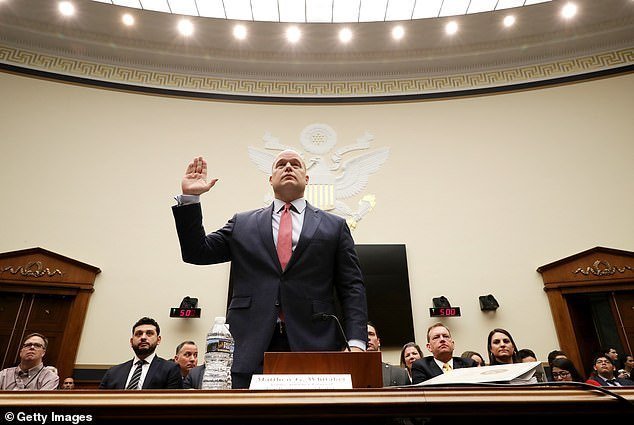Rep. Hakeem Jeffries (D-N.Y.) put it all on the table during a testy hearing today asking how Matthew Whitaker became President Trump’s acting attorney general.
“I’m confused. I really am. We’re all trying to figure out, who are you? Where did you come from?” Jeffries, a member of Democratic House leadership seen as a possible future Speaker, asked Whitaker during the House Judiciary Committee hearing.
“And how the heck did you become the head of the Department of Justice?” Jeffries stated. “Hopefully you can help me work through this confusion.”
When Whitaker began to respond, Jeffries promptly cut him off and chided: “That was a statement, not a question.”
“I assume you know the difference,” he said.
It was just the latest confrontational moment of the hearing, one of the first to center on special counsel Robert Mueller’s investigation and the legal controversies swirling around President Trump since Democrats took over the House.
Whitaker is seen as a Trump loyalist, and he is expected to be replaced as attorney general as soon as William Barr wins confirmation in the Senate.
Whitaker took the post when Trump fired former Attorney General Jeff Sessions, who had recused himself from overseeing the Russia investigation — earning Trump’s wrath in the process.
Jeffries listed former Trump campaign aides who have pleaded guilty in Mueller’s probe, naming former Trump campaign chairman Paul Manafort, the president’s former personal lawyer Michael Cohen, Trump’s former national security adviser Michael Flynn, and his longtime adviser Roger Stone.
“Manafort, Gates, Flynn, Cohen, Papadopoulos and Stone are all in deep trouble. One by one, all of the president’s men are going down in flames,” Jeffries said.
Whitaker said, under oath, that he had not briefed Trump or other senior White House officials about the special counsel’s probe, and that he had not interfered “in any way” in Mueller’s ongoing investigation into Russian interference in the 2016 election.
But Democrats got little else beyond that from Whitaker, who declined to answer many questions on the basis that the special counsel’s investigation (and other criminal investigations potentially involving the president) were ongoing.
Whitaker also refused to talk about conversations he may have had with the White House, citing the possibility that the president might invoke executive privilege.
Whitaker, in one truly remarkable moment, would not say whether he considered the Mueller investigation a “witch hunt,” failing to debunk the partisan attacks on the probe he oversees.
The hearing room burst into loud groans when Whitaker found an unprecedented way to avoid answering a tough question from committee chairman Rep. Jerrold Nadler: He told him that his time was up.
The rules of most hearings allow for each member to spend five minutes questioning a witness.
It’s not unusual for committee chairs to interrupt long-winded answers, or for members to remind their political opponents when they stretch the clock to get more television time.
But Whitaker turned the tables. ‘Mr. Chairman, I see that your five minutes is up,’ he said, prompting an uproar from the gallery and laughter from Nadler, a New York Democrat.
“I am here voluntarily. We have agreed to five-minute rounds,” said Whitaker, the only one in the room who appeared unaware that committee chairmen can bend the rules nearly at will.
Democrats on the dais dropped their jaws in shock.
Rep. Doug Collins of Georgia, the senior Republican on the panel, suggested that Whitaker’s objection was an appropriate “place to end.”
An aide to a senior House Republican said of Whitaker’s jab during a hearing recess: “I’ve never seen that one before. It’s hilarious, but I hope it doesn’t catch on and become a thing.”
